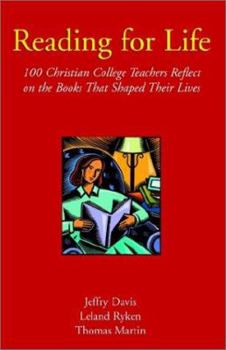Reading for Life
Select Format
Select Condition 
Book Overview
Reading for Life: 100 Christian College Teachers Reflect on the Books That Shaped Their Lives Discover the books that have influenced the thinking of over 100 dedicated teachers from one of the... This description may be from another edition of this product.
Format:Paperback
Language:English
ISBN:1401048706
ISBN13:9781401048709
Release Date:June 2002
Publisher:Xlibris
Length:220 Pages
Weight:0.75 lbs.
Dimensions:0.5" x 5.5" x 8.5"
Customer Reviews
3 ratings
A treasure map for the Christian thinker
Published by Thriftbooks.com User , 21 years ago
There are a number of methods for encouraging intellectual growth and it's important to understand which method you expect, and even prefer, before you begin reading this work. I'm no expert on training materials or teaching methodologies, but I've experienced direction from a seemingly endless host of athletic coaches as well as direction from the good, bad and ugly within Christian higher education. I've learned through dictatorial teachers who provided facts without context or meaning. I've learned through confrontational teachers who taught by destroying misconceptions without personal encouragement. And I've also learned through older, dramatically wiser, fellow travelers willing to share their friendship while we experience the common joy of searching for meaning and understanding.Reading for Life serves as a personal guide to greater literary works than itself. I wouldn't say the book teaches the reader, but I would say instead that it gently leads the reader toward deeper literary treasure. It is best suited for someone who likes to learn through a tutor's suggestions and self effort.The book is not, in and of itself, an intellectual challenge. Nor is that the authors' intent. It provides simple directions to meaningful literary works which can encourage intellectual thought. The authors present their literary suggestions with concerned candor - they set aside the lecture style of instruction and adopt the manner of a favorite aunt or uncle who might gently offer anecdotes to guide a younger family member. As you might imagine, there is much uniformity in the Christian viewpoint of the contributors, so don't expect to find a large amount of controversial material in their suggestions.... one might argue that this is a weakness of the book, but this is inherent to the book's composition, not a fault of the editors.There is very limited input into non-western literature, so don't expect to see Asian or African suggestions or more than a small handful of Latino references and one from Australia. Although Russian literature is well covered, there is no reference to any of Solzhenitsyn's work, nor any foundational socialist works which should be part of any Christian intellect's reading list. This is somewhat surprising since Communism was such a visible Christian opponent through most of the 20th century, but this may also be my own personal bias entering into the review. I should note that Orwell, Huxley and Frankl are represented, so some of this subject matter is peripherally addressed.There is no index listing all of the works cited. The editors have apparently chosen to withhold such a list so that the reader receives each suggestion from the author ALONG WITH the author's comments. This is a delightful touch which makes the book much more than simply a reading list. (However, it might be worth considering an index of referenced authors)For this reviewer, the book lived up to my expectations and, as best I can tell, it sq
Examples of educational leadership, Informed readership
Published by Thriftbooks.com User , 22 years ago
A few years ago, I reviewed Leland Ryken's The Liberated Imagination; since then, I have received numerous e-mails, from new teachers, recent graduates, or generally inquisitive "thinking Christians" asking for similar books. Their question was essentially, "How do I stay connected to the challenging and imaginative body of work I was introduced to throughout college? How do I keep these great questions important for me?" In short, how can I live so that my commencement really signals a beginning?" At something of a loss for the best reply, I pointed them toward the works of literature which have been formative in my own thinking, those writers which set my own imagination ablaze. Here is a collection of 100 such replies. "We do not live long enough to learn all of the things which it is essential for our survival to know:" and Harold Bloom, "there's no time to lose reading bad books." Reading for Life provides not only a path of guided study for the lifetime student, but, through the commentaries, examples of Godly leadership, and Godly readership, from the faculty of one of the most distinguished liberal arts facilities in the country. As a writer and a student of literature, I've rarely been so (grandly, confidently) assured of the value of this discipline, as by Reading for Life [I've also rarely felt so ambitious!]
The formation of Christian intellectuals
Published by Thriftbooks.com User , 22 years ago
What books have gone into the formation of Christian intellectuals? This book contains short entries by a group of Christian college professors on the books that have helped to shape their thought. In some cases the choices are delightfully surprising, as for example one philosopher's selection of P. G. Wodehouse novels. This book will stimulate your appetite to read the books these professors recommend.






